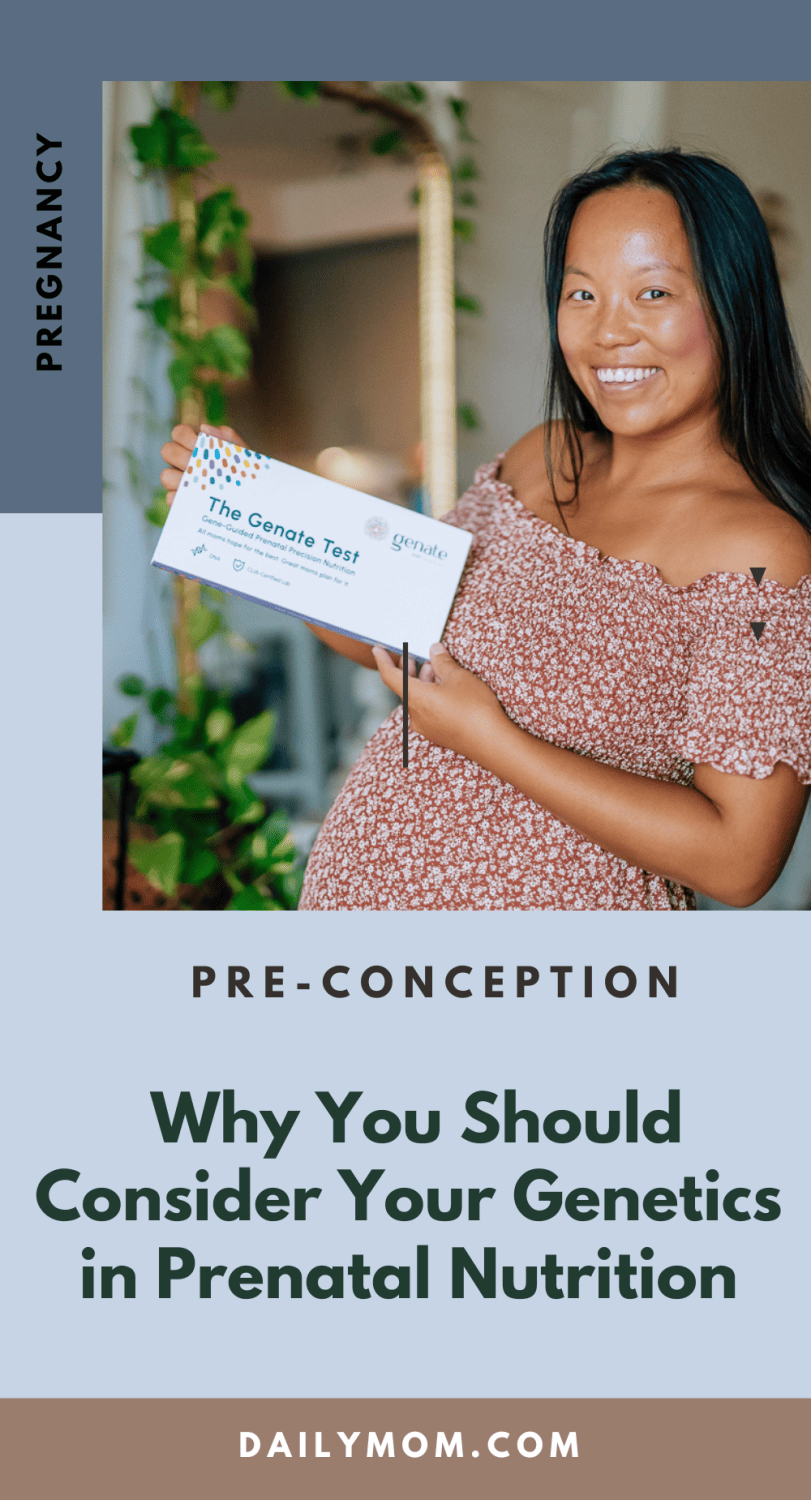Bringing new life into the world is a profound and transformative experience, one that is filled with excitement, anticipation, and, of course, no shortage of questions. You’re pregnant, and you want to ensure your months of pregnancy are as smooth and healthy as possible. Prenatal nutrition plays a pivotal role in this process, providing the essential building blocks for both you and your developing baby. But did you know that your genetics can significantly impact how your body processes and utilizes vital nutrients?
Prenatal nutrition is the process of ensuring the developing baby receives adequate nutrition during pregnancy. It is important for a healthy pregnancy and baby, as the diet of the mother affects the fetus from before the pregnancy all through breastfeeding, and helps to ensure the baby is given the best start. Prenatal vitamins contain necessary nutrients for pregnant women and their babies, and taking one a day is considered important to ensure the best nutrition during pregnancy. But how do you know that an average prenatal is going to give you everything you need, and moreover that you do not have any genetic abnormalities that prevent some nutrients from being absorbed?

Online resources may recommend everything from picks of the best, the best time to take a prenatal, what to look for in a prenatal, types of prenatal gummies, over-the-counter prenatals, prescription prenatal vitamins, vegan prenatals, to a prenatal vitamin that contains the necessary milligrams of DHA and EPA, and the list goes on. But there’s more to the equation than simply taking a prenatal vitamin every day. Understanding how your genes influence your pregnancy, even before you even realize you’re pregnant, can help in overcoming common genetic nutrition challenges. Whether you’re an expectant mother looking to ensure the healthiest start for your little one or a healthcare professional seeking to enhance your understanding of prenatal nutrition, let’s explore the role of essential prenatal multivitamins, the power of personalized genetic reports, and ways to tailor your pregnancy nutrition for your genetic signature.
How Do Genes Impact Prenatal Nutrition?
Most of us know that good prenatal nutrition is important for a healthy baby, but many women don’t understand how genetics can influence their prenatal nutrition status or the impact it can have on becoming pregnant. Whether before, during, or after pregnancy, women can benefit from understanding that genetics plays an important role in how the body processes and responds to nutrients. The benefits of proper prenatal nutrition include lower risks of preterm delivery, birth defects, and other adverse pregnancy outcomes. Prenatal nutrition also helps ensure proper fetal development and weight gain. Additionally, ensuring the mother is getting the right nutrients can reduce the risk of postpartum depression and gestational diabetes.
Inadequate prenatal nutrition can lead to low birth weight, stunted growth, and a higher risk of medical complications. It can also lead to developmental delays, as well as a higher risk of certain chronic illnesses later in life.
So what happens when your genes impact your prenatal nutrition? Experts recommend taking a prenatal multivitamin, but taking a prenatal vitamin may not be enough in the face of a deeper genetic impact.
Your genes play an important role in prenatal nutrition. Some genetic variations can affect the way the body metabolizes nutrients, resulting in special nutritional needs that must be met for a healthy and full-term pregnancy. (A prescription prenatal may help, but genetic testing would still be needed to determine the mother’s exact needs.)
Genes are present in every cell in the body, including cells involved in digestion, metabolism, and nutrient absorption. The genetic makeup of a person influences how food is broken down and how nutrients are absorbed and used by the body. We all have different genetic variations that affect our ability to break down and absorb nutrients, and those variations can impact the amount and type of nutrients needed during pregnancy.
For example, some genes are involved in the metabolism of folic acid, an important B vitamin that helps prevent birth defects. If an expectant mother has a genetic variation in the gene that is involved in the metabolism of folic acid, she may need more folate than the average person or a specific form of folate in order to process the nutrient correctly. Similarly, some genes affect how the body metabolizes other important vitamins and minerals, such as iron and vitamin D.

Genetic variations can also impact how well a pregnant mother responds to certain dietary changes. For example, some genes affect the body’s ability to process dietary fat and cholesterol. Therefore, women with certain genetic variations may need to make dietary modifications to ensure adequate nutrition.
It’s easy to see how having an understanding of the genetic influence on prenatal nutrition can help expectant mothers make informed decisions about their nutrition plan. By understanding their own unique genetic makeup, they can tailor their prenatal diet to ensure they are receiving the nutrients they need during pregnancy.
Read More: The Undeniable Importance Of Mental Health Awareness During Pregnancy
Common Genetic Nutrition Challenges During Pregnancy
Knowing that the underlying genetic makeup of the mother can play an important role in prenatal nutrition is one step to support a healthy pregnancy. Being aware of specific nutritional challenges is another piece of that puzzle. Here are four common genetic nutrition challenges faced during pregnancy:
1. Folate Deficiency: Folate is a B vitamin important for fetal development, and a deficiency can lead to serious health complications. Women who are genetically predisposed to folate deficiency may need to supplement their diet with additional methylfolate, an active form of this vitamin, in order to prevent deficiencies.
2. Metabolism: Genetic factors can also influence the way a pregnant woman metabolizes certain nutrients. For instance, some pregnant women may have a higher risk of developing nutrient deficiencies due to an inability to absorb certain nutrients from food. This is especially true for pregnant women with genetic variations in fat, carbohydrate, and protein metabolism.
3. Vitamins and Minerals: Genetic factors can also play a role in how an expectant mother responds to certain vitamins and minerals. For example, some women may have difficulty metabolizing iron, which can lead to anemia. Others may have a decreased ability to absorb certain B vitamins, leading to a deficiency and an increased risk of complications.
4. Gestational Diabetes: Certain genetic variations may pose an increased risk of the mother developing gestational diabetes. This is a condition in which a woman develops high blood sugar levels during pregnancy, which can be dangerous for both mother and baby. Genetic testing can help identify women who are at an increased risk of gestational diabetes, and allow them to take preventive measures.
Overall, genetics can play a major role in prenatal nutrition. It is important for expectant mothers to be aware of genetic risks that could affect their nutritional needs during pregnancy. Through genetic testing, pregnant women can identify potential genetic challenges and take proactive steps to ensure they are getting the nutrition they need throughout their pregnancy.
In addressing these challenges, it’s also crucial to consider how medications can impact nutritional needs and genetic predispositions. Specifically, Metformin use during pregnancy has gained attention for its role in managing conditions like gestational diabetes. This consideration is especially important for expectant mothers with genetic predispositions affecting their glucose metabolism. Consulting with healthcare providers on the use of medications such as Metformin can provide insights into managing these conditions more effectively, underscoring the importance of tailored prenatal care.
Read More: 5+ Tips and Tricks For Managing Acid Reflux During Pregnancy
Metabolic Pathway Roadblocks and Gene Variations to Consider
Let’s dive a little deeper. Knowing that your genes can impact the health of your pregnancy is a solid start to developing a plan for prenatal nutrition. Beyond that, it’s useful to be aware of specific metabolic pathways and gene variations that may be involved in your nutritional processes.

Metabolic pathways are the series of steps involved in the body’s processes of breaking down and building up molecules. During pregnancy, these pathways act as the nutritional reserves to help the baby grow and develop. Certain metabolic pathways can be disrupted due to genetic variations, leading to a variety of possible issues. Here are a few common variations to be aware of.
- PEMT Pathway: The PEMT gene codes for an enzyme that helps produce phosphatidylcholine, a nutrient needed in very high amounts during pregnancy. Phosphatidylcholine plays critical roles in cell membrane synthesis, fat metabolism, and liver health. It’s also vital for cognitive development through its transformation to choline and betaine, important one-carbon nutrients. Women with certain variants in the PEMT gene need more choline to make up for metabolic inefficiencies in phosphatidylcholine metabolism.
- Folate Pathway: Folate is necessary for many processes in the body, including red blood cell formation, DNA synthesis, and neural tube development. Variations in the genes involved in this pathway can lead to inefficiencies in the absorption of folic acid, leading to possible nutrient deficiencies.
- The MTHFR gene is responsible for making an enzyme called methyltetrahydrofolate reductase. This enzyme helps with the breakdown of folate and homocysteine. Homocysteine is an amino acid found in the blood that can be associated with an increased risk of complications during pregnancy. Certain variations in MTHFR can lead to inefficiencies in breaking down and processing homocysteine and folic acid, leading to increased levels of these nutrients in the blood.
- Methylation Pathway: Methylation is the name for a group of metabolic processes in which methyl groups are added to molecules. Methylation is necessary for folate metabolism, the production of neurotransmitters, energy production, DNA synthesis, and the regulation of gene expression. Gene variants in these pathways can lead to issues with methylation and result in widespread effects for both mother and baby.
- Cytochrome P450 Pathway: This pathway is involved in the breakdown of drugs and other toxins in the body, and can be disrupted by genetic variations. Disruptions in this pathway can lead to an inability to break down and process drugs or toxins properly, leading to an increased risk of complications during pregnancy.
- Glutathione Pathway: Glutathione is an antioxidant that helps to protect cells from damage. Variations in this pathway can lead to an inability to break down and absorb glutathione properly, leading to an increased risk of cell damage and an increased risk of complications during pregnancy.
It is important to understand the effects that genetic variations can have on metabolic pathways, as they can significantly impact the health of the mother and the baby. Expectant mothers should consider having genetic testing done to identify any potential metabolic pathway roadblocks and gene variations that may need to be addressed before and during pregnancy.
Read More: 10 Ways To Survive (& Even ENJOY) Your First Trimester Of Pregnancy
Optimizing Your Prenatal Nutrition Plan with the Genate Report
Genetic variations can make it difficult to get the right nutrition during pregnancy, potentially leading to health complications for both mother and baby and even posing nutrition challenges during breastfeeding. Fortunately, there is now a way to identify genetic variants that affect nutrient metabolism, allowing you to optimize your prenatal nutrition plan to meet your unique needs and ensure you’re getting the proper prenatal vitamins.
Genetic testing can help expectant moms understand their unique dietary needs and adjust their prenatal nutrition plan accordingly. Genetic testing takes out the guesswork and efficiently helps you uncover any potential genetic risks in metabolic pathways that could impact your nutrition status. Before you just start taking prenatal vitamins, consider taking a genetic nutrition screening test like the Genate Test to determine whether you have variants that may be impacting your body’s ability to metabolize key nutrients needed for fetal development. Then you can talk to your doctor, dietitian, or other healthcare provider to create a personalized prenatal nutrition plan tailored to your specific needs.

The Genate Test uses an algorithm to analyze 325 gene variants that impact nutrient metabolism, including one-carbon nutrients, essential fats, vitamins, and minerals. After taking the at-home, saliva-based test and mailing in your sample, you’ll receive a detailed report of your gene variants and nutrition recommendations based on your genetic profile. The Genate Report provides an in-depth analysis of the genetic variations associated with prenatal nutrition, and how they impact your body’s ability to absorb, metabolize, and utilize nutrients. The report also provides guidance on how to adjust your nutrition plan to meet your individual needs during pregnancy. It includes components such as:
- A personalized list of essential nutrients and your unique daily value to consume during pregnancy
- Dietary guidelines and recommendations on best foods and meal plans that will provide the optimal nutrition for both mother and baby
The Genate Report is comprehensive, containing genetic insights about an expectant mom’s nutritional needs during pregnancy. It includes detailed information about genetic variations, metabolic pathways, and specific dietary recommendations. The Genate Report also includes the mom’s genetic risk for nutrient deficiencies as well as potential benefits from certain nutrients.
Genate also offers personalized nutrition counseling services to help expectant moms create and stick to a nutrition plan tailored to their needs. Counseling is provided by registered dietitians who will interpret your test results and help you adjust your diet during pregnancy for optimal prenatal nutrition. They can also guide you to the right supplements for your genetically-based nutrition needs.
By utilizing the Genate Report and the personalized nutrition counseling services, you can ensure you are getting the optimal nutrition during pregnancy to reduce the risk of complications and promote the health of both you and your baby.
Read More: Getting Pregnant: 2 Simple Visualizations That May Help
Understanding Your Unique Dietary Requirements Beyond Taking Prenatal Vitamins
Expectant moms already have unique dietary requirements. Genetic testing helps identify more specific and tailored dietary needs by revealing any gene variations that may influence the way their bodies metabolize certain nutrients. With this information, expectant moms can target their prenatal nutrition plan for their unique needs. Here are some standard dietary requirements to consider in your unique prenatal nutrition plan:
1. Nutrients: The type and amount of nutrients needed during pregnancy vary depending on your individual genetic makeup. For example, some expectant moms may need more specific vitamins and minerals due to their genetic makeup, while others may require fewer of certain nutrients to meet their needs. Genetic testing can help expectant moms determine their optimal nutrient requirements and develop a plan, one that best fits their needs.
2. Lifestyle: Lifestyle factors not only impact your current nutrition but may impact how you pursue a nutritional plan for pregnancy. For example, if an expectant mom is vegetarian or vegan, she will need to make sure she is getting enough of the essential vitamins and minerals that are not available in plant-based foods. Similarly, an expectant mom who has a food allergy or intolerance should make sure her prenatal nutrition plan includes foods that do not trigger any adverse reactions.
3. Deficiencies: Dietary deficiencies can have serious consequences during pregnancy, so expectant moms should work with their healthcare provider to identify any nutritional deficiencies and create an individualized nutrition plan that meets their needs. In addition to taking prenatal vitamins, expectant moms should ensure they are consuming a balanced and varied diet that includes plenty of fresh fruits and vegetables as well as lean proteins, whole grains, and healthy fats.
4. Portions: It’s also important for expectant moms to pay attention to their portion sizes and limit their intake of sugar, sodium, and saturated fats. Staying well-hydrated is also crucial for expectant moms. Expectant moms should also aim to limit their intake of processed foods and opt for nutrient-dense alternatives whenever possible.
By taking the time to understand their unique dietary requirements, expectant moms can ensure they are getting the proper nutrients to nourish themselves and their babies. Genetic testing can provide valuable insight into an expectant mom’s nutritional needs and help her develop a personalized nutrition plan to meet those needs.

Read More: 5 Essential Tips for Preparing For a Baby: Your Ultimate Guide!
Happy Moms, Healthy Babies: Essential Prenatal Nutrition Hub
When expecting a baby, moms-to-be want to ensure that they are nourishing both themselves and their unborn child. And despite the difficulty in knowing if a mom is getting the adequate amount and type of nutrients needed to support the pregnancy, simply optimizing prenatal nutrition is an important step in providing the best health and development for a growing baby.
There are many resources available on prenatal nutrition. Many websites and books provide recipes, meal plans, and nutrition tips specifically designed for pregnant women. You can also talk to your nutritionist or health professional to get personalized advice on the vitamins and minerals you need.
Read More: Challenges of Anxiety of Pregnancy: Break Free From Maternal Anxiety Now
Top Prenatal Nourishing Tips for Good Nutrition
Focusing on nourishing foods is one of the best proactive steps an expectant mother can take. Eating a variety of nutrient-rich foods can help provide the necessary vitamins and minerals for both mom and baby, as well as help support morning sickness and other challenges in the first trimester. It is also important to limit unhealthy foods that contain empty calories, added sugars, and saturated fats. These foods are not only unhealthy but can also increase the risk of complications during pregnancy. Here are five nourishing tips to consider:
1. Folic Acid and Iron: Focus on eating foods that are high in folate (the natural form) and folic acid (the synthetic form). Folic acid is a B vitamin that helps decrease the risk of neural tube defects in babies. Leafy greens, oranges, and beans are all excellent sources of folate. Additionally, iron is also an important nutrient for both mom and baby, as it helps prevent anemia in the mom and helps the baby’s cognitive development. Foods such as red meat, poultry, beans, and fortified cereal are all good sources of iron.
2. Water: Being dehydrated can lead to fatigue, headaches, and constipation. It is recommended that moms-to-be drink at least 8 glasses of water a day.
3. Vitamins and Minerals: Vitamins are crucial, and prenatal vitamins include additional nutrients needed to support a pregnancy. Many prenatal vitamins also cover specific demands of pregnancy, like folic acid, choline, and DHA. Prescription and over-the-counter prenatal vitamin options to take during pregnancy are a good way to make sure you’re getting the nutrients pregnant people need. However, it’s best to consult with a doctor before taking any prenatal vitamins or supplements.
4. Caffeine: While small amounts of caffeine are generally safe, too much can lead to a range of issues such as an increased risk of miscarriage and preterm birth. Limiting your caffeine intake is generally a good idea.
5. Activity: Exercise helps to lower stress levels, maintain a healthy weight, and improve overall health. However, it is important to talk to a doctor before engaging in any physical activity.
By eating a balanced diet, drinking enough water, taking prenatal vitamins, limiting caffeine consumption, and staying active, expectant moms can ensure that their bodies and their babies are getting the nutrition needed for a healthy pregnancy. With the proper nutrition, moms can have happy, healthy babies.

Read More: How to Use Meditation for a Healthy Pregnancy in 2022
Choosing the Best Prenatal Vitamin for Your Unique Genetic Signature
When it comes to prenatal nourishment, every expectant mom has unique needs. Factors like age, weight, health, and activity level all play a role in determining nutritional needs. But so do genetics, and genetic testing can be a powerful tool to help expectant moms determine their unique nutritional needs and develop a personalized nutrition plan tailored to their genetic signature.
Understanding and optimizing prenatal nutrition based on an individual’s genetic signature can be a daunting task, which is why the Genate report exists. Getting that comprehensive report with detailed information about your unique genetic profile and nutritional needs is a true game changer, providing valuable insight into your nutritional needs, and tailored recommendations on how to optimize your prenatal nutrition plan. With the report, you can make informed decisions about your nutrition plan, taking into account your genetic profile, individual needs, and lifestyle.
By understanding and optimizing prenatal nutrition to your unique genetic signature, you can give your baby the best start in life. However, it is important to remember that genetics is only one part of the equation. Lifestyle, health, activity level, and age all play a critical role.
Ultimately prenatal nutrition is an essential part of a healthy pregnancy. It is important for expectant moms to understand the genetic factors that can affect prenatal nutrition and how this can influence their prenatal nutrition plan. By utilizing the resources available, such as Genate’s personalized report, expectant moms can ensure they get enough of the right nutrients and make healthy lifestyle changes to nourish both mom and baby.
EXPLORE AND CONNECT:
Genate
WANT TO READ MORE?
Check out Daily Mom’s Pregnancy section for more tips and tricks!
CONNECT WITH DAILY MOM
💖 NEWSLETTER: DAILY READS IN YOUR INBOX 💖
Sign up to receive our picks for the best things to do, see and buy so you can relax and focus on more important tasks! Let us help you be the best version of yourself you can be!
BE SOCIAL WITH US
📌 LOVE IT? PIN IT!📌












































